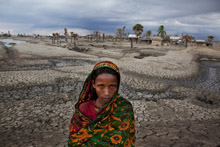| |
Tiger widows of Bangladesh
Sundarban, it is the pride of Bangladesh, home of the magnificent Royal Bengal Tiger, rarely seen, hidden in the jungles. But now the tigers, which roam through the vast mangrove forests, are coming into closer contact and conflict with humans, attacks on people are on the rise. It is estimated that tigers in the Sundarban kill every year 120 people.
Climate change is causing accelerated sea level rise and an increase in the salinity of the southern Sundarban. Just on the other side of the forest the landscape is desert like. The deeply cracked soil is not allowing any plant to spring up. Intensive shrimp cultivation helps to increase the salinity even further.
Many farmers cannot survive on farming anymore and are forced to venture deep into the forest for fishing, honey and wood collecting and are particularly vulnerable for attacks. The intensive exploitation of the forest forces also the tigers to the mainland in their search for food. Conservationists are working with local villagers who`ve lived through tiger attacks, trying to persuade them that they need to preserve their whole eco-system if their way of life is to survive.
The villagers of the Sundarban turn to their local goddess Bonbibi (Lady of the Forest). In tiny thatched roof shrines, Hindus and Muslims alike pray to the goddess for protection, before they venture back into the forest. The superstition is enormous. A woman who`s husband leaves to the Sundarban, can not comb her hair, can not cook in the middle of the day, is not allowed to wash their clothes, is unable to clean her house,….
If one`s husband gets killed by a tiger she is seen as harbingers of bad luck among the superstitious local people, she is avoided, expelled and, after the dramatic death of her husband, thrown out by her husband`s family, with whom she has been living since her wedding. Already poor, she has no choice but to search for provision for her family herself.
|

View Gallery
|
|
| |
| © All photograph right reserved by Naymuzzaman Prince. |
|

